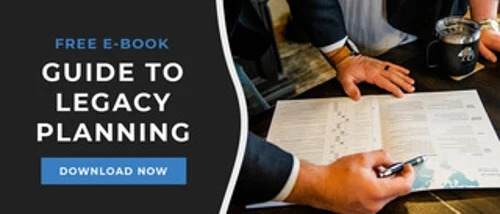Legacy planning and estate planning are two of the most frequently heard terms in conversations about comprehensive financial planning. However, the general public often confuses the two with each other.
Upon first glance, legacy planning and estate planning share quite a few similarities. For example, both deal with your assets on a holistic scale. In addition, both can impact not only yourself but your loved ones.
So, what exactly are the differences between legacy planning and estate planning? This article will shed light on what type of planning is right for you by taking a deep dive into their definition, importance, and the crowd they serve.
What is Legacy Planning
Legacy planning is considered end-of-life planning. Simply put, legacy planning prepares people to “bequeath their assets a loved one or next of kin after death.” However, death is a complicated and emotional process. Therefore, legacy often goes beyond mere asset planning and taps into the legal and emotional side.
Financial assets included in legacy planning could be:
- Personal property and assets
- Real estate investments
- Other investments, such as stocks and bonds
- Wealth and retirement accounts, such as savings
- Valuables
Meanwhile, you should also consider adding items with significant emotional values to your legacy planning, such as explaining your core values, family heirlooms, and private gifts to each loved one. You can also include charitable giving instructions in your legacy planning and give back to the community.
Who Needs Legacy Planning
Our lives will all come to an end at some point. Therefore, everyone needs legacy planning. There is no need to avoid talking about planning your grand exit. Instead, legacy planning will leave your loved ones in good hands.
Meanwhile, legacy planning could be more critical to some individuals than others. For example, if you have an extensive family, going through all your assets and belongings by yourself could be exhausting. In other cases, you may want to include your own medical and funeral cost as part of your legacy planning.
And again, if you’d like to give to a foundation or charity, working with a legacy planner will make the process much easier and beneficial for both yourself and the cause you support.
Why is Legacy Planning Important
Losing a loved one is hard enough. The survivors shouldn’t need to be bothered further with inheritance, expenses, and potential conflicts. Investing in legacy planning makes the transition slightly easier for those left behind. It is your one last chance to take care of those who mean the most to you.
Legacy planning makes sure you complete your final life stage properly. It helps you sort through your matters and minimize the burden on your family. For example, a critical portion of legacy planning is learning to cover the cost of end-term care and the funeral.
Additionally, legacy planning also ensures your values are spoken, and your deeds remembered. For those choosing to make a legacy giving, their names are often announced and remembered by the foundation or organization they support. And for those who have an extensive family, the estate plan will distribute their assets among family and friends orderly, thus avoiding any potential conflict.
What is Estate Planning
In the meantime, estate planning is also about ensuring the proper management and handling of assets in the case of an accident, such as incarceration or death. But the core difference is that estate planning is more of a living matter.
Estate planning works with all your assets, including
- Cash
- Real estate
- Assets, such as cars, boats, and other high-value items
- Investments
- Savings
Unlike legacy planning, estate planning often solely focuses on the assets. Therefore, an average estate plan usually covers the following aspects.
- Tax advantages, or tax avoidance
- Medicaid planning
- Retirement planning
- Incapacity planning
Estate planning is also an ongoing process. For example, having a second or third child will affect your existing estate plan. On the other hand, legacy planning is usually done once and for all.
Who Needs Estate Planning
A common misunderstanding is that only high-value individuals with a significant amount of assets need estate planning. In reality, almost everyone with a household and some sort of asset would benefit from estate planning.
Of course, the more complicated your asset structure is, the more critical it becomes to have a comprehensive estate plan. Also, as we’ve mentioned earlier, a larger household with many relatives and siblings naturally requires a more sophisticated estate plan.
Why is Estate Planning Important
Have you ever heard of the idiom “prepare for the rain before it rains?” Indeed, preparation and disaster readiness is the core value behind estate planning.
According to a recent survey, 68% of Americans do not have an up-to-date will. The main reason is often that the person didn’t think they had enough assets to be needing a will, or that they didn’t think they were old enough to be considering a will yet.
But life is unpredictable. And when the worst happens, estate planning is what safeguards your family members and ensures everyone, instead of only your direct heir, is taken care of. Furthermore, estate planning also allows you to distribute your assets in your desired way.
Start Planning for the Future
If you have never had a will or haven’t updated your living will, you should start looking into estate planning. On the other hand, if you believe you’re heading to the end of your life, then it’s time to talk about legacy planning.
Regardless, both types of planning fall into the category of comprehensive financial planning. Therefore, it would be the most efficient if you sought out a financial advisor specializing in estate and legacy planning. At BentOak Capital we are positioned to be able to assist you in both areas. We’d love the opportunity to speak with you a little more about what your goals and dreams are for your legacy and estate, so please contact us today.

